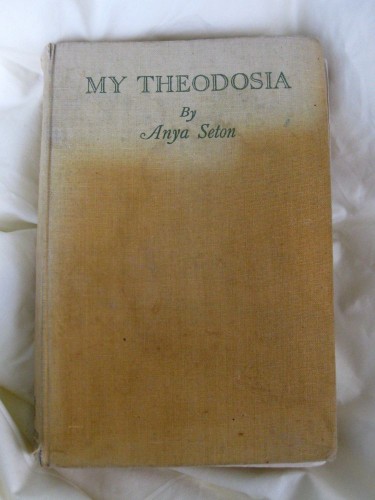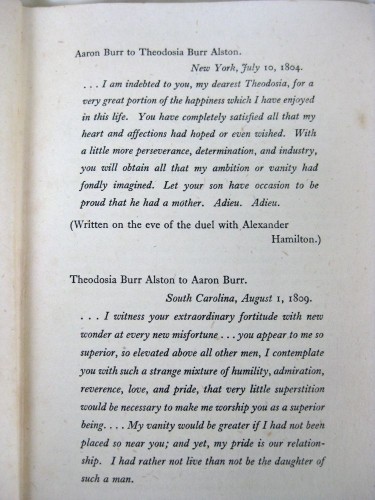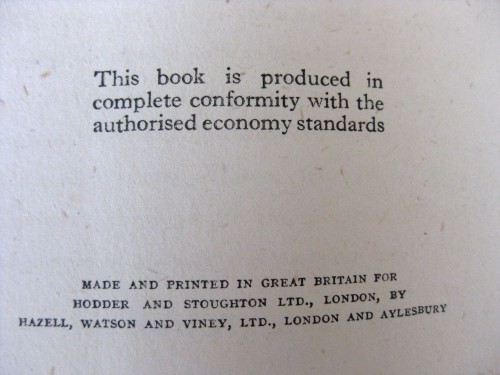I’ve already mentioned my inclination to pick up old books at op shops just because they have pretty covers, and interesting titles. Sometimes it pays off, and sometimes…it doesn’t.
Alas, this week’s review, My Theodosia by Anya Seton, is the latter.
It looked like a promising book. It’s about the mysteriously tragic Theodosia Burr Alston, who was the only child of the fascinating and controversial Aaron Burr.
Now, if you aren’t American, you’ve probably never heard of Aaron Burr, and if you are, you probably remember some school lesson about a duel where he cowardly murdered Alexander Hamilton, making himself one of the most loathed figures in early American history.
The truth, as always, is far more complicated. What we don’t generally recall from the school lesson is that Burr was Vice President of the US under Thomas Jefferson, and that he is credited with instituting the modern American presidential campaigning system. I’m not sure that fact is to his credit, and neither are the (possibly completely unfounded and spurious) charges that he attempted to lead a mini-revolution/coup with the aim of creating his own personal empire out of bits of the newly forged US, or out of Mexico. Details are unclear.
Other aspects of Burr’s character are more promising. He (unlike the far more respected Jefferson) had abolitionist leanings, and was an advocate of equality between men and women. He owned and referred to Wollestonecroft’s works, and educated Theodosia to an exceptionally high standard. Many of the allegations made against him seem to have been motivated more by politics than truth, and even his worst enemies expressed admiration of his term as President of the Senate, and of his generosity. And it may have been Hamiltons fault that he got shot in the duel, as he may have tried to cheat but mixed up the pistols. All of these have led to a reassessment of Burr’s achievements and character in recent years.
Alas, My Theodosia doesn’t include this reassesment (well, it was written in 1945, but Seton did do extensive research to write her novel, and might have tried to think beyond the stereotypes of the times).
Actually, that touches upon the whole problem with My Theodosia, and why I disliked it so much. Seton read all of Burr and Alstons writings, and did research into the period, but this had no apparent effect on the final product. None. Zip. Zilch. It’s like Seton had her plot in mind, then did the research and threw in some random quotes and bits of research, but ignored the vast quantity of evidence that didn’t support her plot and characterisations. And her characterisations do not make for realistic, likeable, interesting, fully dimensional characters.
Burr is every horrible stereotype compiled from every slur ever slung at him, in complete contrast to the bits of his writing that Seton quotes throughout the book. Theodosia is constantly described as brilliant and sparkling, an intelligent, educated, accomplished woman in line with contemporaneous descriptions of her, but all her actions are that of a weak willed milksop. She cries, mopes, whinges, says ‘yes’ to marrying a guy she loathes because daddy says so, and can’t make a single friend. Isabella Swann is a sterling role model in comparison.
All this spineless lamenting is particularly grating because early in the novel Seton describes how disappointed Burr was with a portrait of Theodosia that depicts her as a ‘milk and water miss’, without spark or character. Seton has clearly missed the irony of her own portrayal of Theodosia being that of a milk and water miss with no brains or personal charm.

Theodosia Burr Alston by John Vanderlyn, 1802 - the 'milk and water' portrait, though Seton gets the artist wrong in the book
As the final member of the inglorious trio, Theodosia’s husband, Alston, is depicted as extremely dumb and easily led, completely ignoring the fact that in his own lifetime he managed to be Governor of South Carolina and a successful businessman.
The only likeable character in the book is Merriweather Lewis, whom Seton has blithely concocted a (completely unsupported by historical facts) romance for with Theodosia. And the romance is cringe-worthy.
So, one thing to loathe about the novel is that the three main characters are both unlikable and inconsistent. The other is the dreadful descriptions of 1800s dress (silk riding habits and low necklines for traveling indeed!), but the thing that really distressed me about the novel, and made it almost impossible for me to finish it, is the racism.
My Theodosia is racist. Not in a sense that Seton was trying to capture the racial attitudes of the 1800s, and not in a outdated 1940s vocabulary cringe-worthy way, but in a deeply ingrained, totally loathesome and disgusting personal sense, which can only reflect Seton’s own views. And Seton is not just prejudiced against the slaves that Theodosia encounters in New York and South Carolina, but the whole of the South. Perhaps Seton is trying to paint a picture of Theodosia’s unhappiness in her marriage, but if she is, she fails entirely to separate it from her own leanings, and to support it with historical fact. In any case, the descriptions of the slaves on Alston’s South Carolina plantation are almost unbearable.
Even without the racism, there is no reason to read My Theodosia, and with it, well, the books almost worth burning. OK, maybe not that far, but I sure didn’t feel bad when I accidentally spilled a whole cup of tea on the book.
So skip it, and if you want to know a bit more about Theodosia, and all the fascinating (and mostly improbable) stories of her death/disappearance, just go read the Wikipedia article. Or buy a newer Burr biography.
In fact, the only good things about the book are that it might inspire you to do further research on the first years of the 19th century in America, and the publishing details in the first edition.






What an interesting post. I never knew much about Burr or his daughter. Your review was very insightful and just shows how prejudice the world was in 1945 than now. We still have so far to go, but it is nice to see that we’ve progressed as a people even this much.
Fascinating. Thanks for sharing this. I hadn’t heard of Aaron and Theodosia Burr before (though, bizzarrely, I think I have heard of Anya Seton. Related to Ernest Thompson Seton, yes?). What a terrible book. I realise 1945 was a different time, but this sounds utterly awful. And surely the whole point of research is that it finds its way into the finished product?
I’m pleased to know someone else gets all frothy at the mouth when historical narratives contain clothes inappropriate to the period. Recently I had a book I just gave up on because it was set in Shakespearian England but the clothes, and also the language, were just plain wrong. Really wrong. The author hadn’t even done basic research and if they can’t be bothered, neither can I.
Really interesting post. Did you finish the book or toss it aside in disgust?
I didn’t know about Burr setting up his own republic… Hmmm… I always rather liked him for his progressive leanings.
I finished it, but only because I planned to do a review. If it hadn’t been ‘work’ I would never have got through it!
I’ve never heard of them… I think. Even though I have already seen the white portrait…
I think this is the reason why I usually only buy books I have read and fallen in love with in the local library… Which, on the other hand, prevents me from getting to know new books. It’s complicated.
Sorry this one was a dud–I haven’t read any Seton, people seem to love her or leave her 🙂 Sometimes I feel like reading “historical” historical fiction is really much more enlightening for the period it was written during than the period it was set in.
By the way, I can never think of Aaron Burr without thinking of this old Got Milk commercial:
http://youtu.be/OLSsswr6z9Y
Ugh. I can’t get over my disgust at the racism, so I’m horrified that anyone could love her.
I’ve heard of the Got Milk commercial but never seen it till now – thanks for linking!
I think she wrote a lot of early through Tudor England stuff (?not sure exactly…) so maybe people haven’t encountered the racism? I can only hope…
That was exactly my thought. But now that I know, I don’t think I could ever overlook it and enjoy her other works kwim?
How interesting. I’ve not read this book but I’ve read a couple of Seton’s other novels and really liked them – “Katherine” in particular is lovely (it’s about John of Gaunt’s mistress, later wife, in the period before the Wars of the Roses), and I didn’t notice any racism in her other works. I’m kind of tempted to read “My Theodocia” just to compare it to the others, though I will read it now informed by your historical insight, which I would not have had otherwise. I’d encourage you not to give up on Anya Seton altogether – I can’t unequivocally recommend all her books, but “Katherine” is well-written, consistent, and historically accurate so far as we can know, since little is known about Katherine herself.